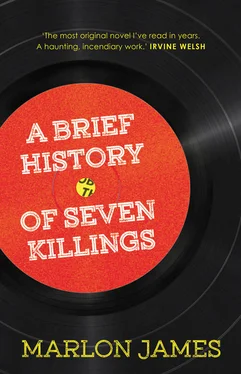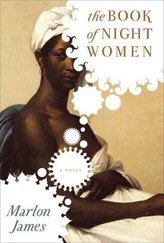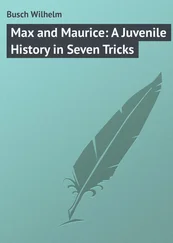If you don’t watch how you sleep, you’ll find yourself the way the living found you. Me, I’m lying on the floor, my head a smashed pumpkin, with my right leg twisted behind the back and my two arms bent in a way that arms aren’t supposed to bend, and from high up, from the balcony, I look like a dead spider. I am up there and down here and from up there I see myself the way my killer saw me. The dead relive a motion, an action, a scream, and they’re there again just like that, the train that never stopped running until it ran off the rails, the ledge from that building sixteen floors up, the car trunk that ran out of air. Rudeboys’ bodies bursting like pricked balloons, fifty-six bullets.
Nobody falls that way without being pushed. I know. And I know how it feels and looks, a body that falls fighting air all the way down, grabbing on to clumps of nothing and begging once, just once, just goddamn once, Jesus, you sniveling son of a mongrel bitch, just once that air gives a grip. And you land in a ditch five feet deep or on a marble-tiled floor sixteen feet down, still fighting when the floor rises up and smashes into you because it got tired of waiting for blood. And we’re still dead but we wake up, me a crushed spider, him a burned cockroach. I have no memory of coffins.
Listen.
Living people wait and see because they fool themselves that they have time. Dead people see and wait. I once asked my Sunday school teacher, if heaven is the place of eternal life, and hell is the opposite of heaven, what does that make hell? A place for dirty little red boys like you, she said. She’s still alive. I see her, at the Eventide Old Folks Home, getting too old and too stupid, not knowing her name and talking in so soft a rasp that nobody can hear that she’s scared of nightfall because that’s when the rats come for her good toes. I see more than that. Look hard enough or maybe just to the left and you see a country that was the same as I left it. It never changes. Whenever I’m around people they are exactly as I had left them, aging making no difference.
The man who was father of a nation, father to me more than my own, cried like a sudden widow when he heard I had died. You never know when people’s dreams are connected to you before you’re gone and then there’s nothing to do but watch them die in a different way, slow, limb by limb, system by system. Heart condition, diabetes, slow-killing diseases with slow-sounding names. This is the body going over to death with impatience, one part at a time. He will live to see them make him a national hero and he will die the only person thinking he had failed. That’s what happens when you personify hopes and dreams in one person. He becomes nothing more than a literary device.
This is a story of several killings, of boys who meant nothing to a world still spinning, but each of them as they pass me carry the sweet-stink scent of the man that killed me.
The first, he screams his tonsils out but the scream stops right at the gate of his teeth because they have gagged him and it tastes like vomit and stone. And someone has tied his hands tight behind his back but they feel loose because all the skin has rubbed off and blood is greasing the rope. He’s kicking with both legs because right is tied to left, kicking the dirt rising five feet, then six, and he cannot stand because it’s raining mud and dirt and dust to dust and rocks. One rock claps his nose and another bullets his eye and it’s erupting and he’s screaming but the scream runs right to the tip of his mouth then back down like reflux and the dirt is a flood that’s rising and rising and he cannot see his toes. Then he’ll wake up and he’s still dead and he won’t tell me his name.
ORIGINAL ROCKERS, December 2, 1976
I know I was fourteen. That me know. I also know that too many people talk too much, especially the American, who never shut up, just switch to a laugh every time he talk ’bout you, and it sound strange how he put your name beside people we never hear ’bout, Allende Lumumba, a name that sound like a country that Kunta Kinte come from. The American, most of the time hide him eye with sunglasses like he is a preacher from America come to talk to black people. Him and the Cuban come sometimes together, sometimes on they own, and when one talk the other always quiet. The Cuban don’t fuck with guns because guns always need to be needed, him say.
And I know me used to sleep on a cot and I know that my mother was a whore and my father was the last good man in the ghetto. And I know we watched your big house on Hope Road for days now, and at one point you come talk to us like you was Jesus and we was Iscariot and you nod as if to say get on with your business and do what you have to do. But I can’t remember if me see you or if somebody told me that him see you so that me think I see it too, you stepping out on the back porch, eating a slice of breadfruit, she coming out of nowhere like she have serious business outside at that time of night and shocked, so shocked that you don’t have no clothes on, then she reach for your fruit because she want to eat it even though Rasta don’t like when woman loose and you both get to midnight raving, and I grab meself and rave too from either seeing it or hearing it, and then you write a song about it. The boy from Concrete Jungle on the same girly green scooter come by for four days at eight in the morning and four in the evening for the brown envelope until the new security squad start to turn him back. We know about that business too.
In the Eight Lanes and in Copenhagen City all you can do is watch. Sweet-talking voice on the radio say that crime and violence are taking over the country and if change ever going to come then we will have to wait and see, but all we can do down here in the Eight Lanes is see and wait. And I see shit water run free down the street and I wait. And I see my mother take two men for twenty dollars each and one more who pay twenty-five to stay in instead of pull out and I wait. And I watch my father get so sick and tired of her that he beat her like a dog. And I see the zinc on the roof rust itself brown, and then the rain batter hole into it like foreign cheese, and I see seven people in one room and one pregnant and people fucking anyway because people so poor that they can’t even afford shame and I wait.
And the little room get smaller and smaller and more sisterbrothercousin come from country, the city getting bigger and bigger and there be no place to rub-a-dub or cut you shit and no chicken back to curry and even when there is it still cost too much money and that little girl get stab because they know she get lunch money every Tuesday and the boys like me getting older and not in school very regular and can’t read Dick and Jane but know Coca-Cola, and want to go to a studio and cut a tune and sing hit songs and ride the riddim out of the ghetto but Copenhagen City and the Eight Lanes both too big and every time you reach the edge, the edge move ahead of you like a shadow until the whole world is a ghetto, and you wait.
I see you hungry and waiting and know that it’s just luck, you loafing around the studio and Desmond Dekker telling the man to give you a break, and he give you the break because he hear the hunger in your voice before he even hear you sing. You cut a tune, but not a hit song, too pretty for the ghetto even then, for we past the time when prettiness make anybody’s life easy. We see you hustle and trying to talk your way twelve inches taller and we want to see you fail. And we know nobody would want you to be a rudeboy anyway for you look like a schemer.
And when you disappear to Delaware and come back, you try sing the ska, but ska already left the ghetto to take up residence uptown. Ska take the plane to foreign to show white people that it’s just like the twist. Maybe that make the Syrian and the Lebanese proud, but when we see them in the newspaper posing with Air Hostess we not proud, just stunned stupid. You make another song, this time a hit. But one hit can’t bounce you out of the ghetto when you recording hits for a vampire. One hit can’t make you into Skeeter Davis or the man who sing them Gunfighter Ballads.
Читать дальше












